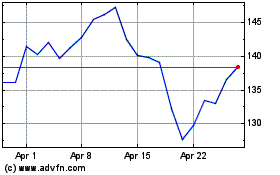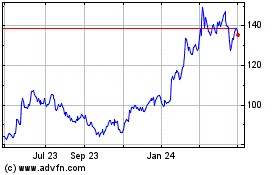TSMC Sets Up for Soaring Chip Demand
April 15 2021 - 8:12AM
Dow Jones News
By Stephanie Yang and Yang Jie
Taiwan Semiconductor Manufacturing Co. said it would raise its
capital spending budget and revenue growth forecast for 2021, a
sign of confidence from the world's biggest contract chip maker
that soaring global demand for semiconductors will persist.
The chip maker said Thursday while reporting its quarterly
earnings that it would raise its capital expenditures to $30
billion this year, from an earlier range of $25 billion to $28
billion announced in January. The Hsinchu, Taiwan-based company
also raised its revenue growth forecast to 20% for the year, from
an earlier estimate of 15% growth.
The chip maker's heftier investment budget comes as its global
competitors also move to beef up production capacity amid a global
chip shortage that TSMC expects to extend into 2022.
TSMC's upward revision in capital spending for 2021 effectively
pulls forward some of the planned investment the semiconductor
giant had announced earlier this month, when it announced a record
spending spree of $100 billion over the next three years to build
out more of its production capacity.
"Our customers are currently facing challenges from the
industrywide semiconductor capacity shortage," said TSMC's chief
executive C.C. Wei. Mr. Wei blamed the shortage on what he thinks
will be a permanent increase in longer-term demand for chips, as
well as shorter-term imbalances in the supply chain.
Intel Corp. recently announced a $20 billion investment to build
two new chip factories in the U.S. starting in 2024, while South
Korea's Samsung Electronics Co. has said it plans to invest about
$116 billion by 2030 to diversify its semiconductor production
capabilities.
Mr. Wei said TSMC, which counts Intel as an important customer,
supports the Santa Clara, Calif.-based company's decision to invest
in its own manufacturing capabilities, though he said that TSMC
would also seek to compete with it.
"We will collaborate in some area[s] and compete in other
area[s]," Mr. Wei said. "TSMC has never been short on competition
in our 30-plus year history, and we know how to compete."
As competition in the semiconductor industry increases and
technological breakthroughs become more expensive, TSMC has begun
passing along the higher investment costs to buyers of its wafers.
In a recent letter to clients, TSMC said it would suspend wafer
price reductions for one year starting at the end of 2021.
"We are taking actions to ensure that we are earning a proper
return by firming up our price," Chief Financial Officer Wendell
Huang said Thursday.
On the question of the global semiconductor shortage, TSMC
executives said that while part of the current scarcity of chips
was due to short-term constraints, they expect supplies to be
strained well into next year as demand remains strong and customers
stockpile chips amid concerns about rising geopolitical tensions
and the continuing pandemic.
Auto makers were caught flat-footed after many canceled chip
orders in anticipation of a pandemic sales plunge that instead
became a surge in car buying. Meanwhile, the sudden shift to remote
work in many parts of the world sent demand for electronic devices
soaring.
The geographical concentration of the world's chipmaking
capabilities, two-thirds of which is located in Taiwan, has come
into focus as countries seek to limit their technology dependence
on others.
On Monday, U.S. President Joe Biden called for bipartisan
efforts to strengthen the domestic semiconductor industry at a
meeting to address the chip shortage. Mr. Biden's $2.3 trillion
infrastructure proposal includes $50 billion for the American
semiconductor industry.
TSMC has announced plans to build a $12 billion chip
manufacturing plant in Arizona, though the company said Thursday
that it would continue to focus its expansion efforts in
Taiwan.
TSMC's net profit for the first three months of the year rose
19% from the same period a year earlier to 139.69 billion New
Taiwan dollars, equivalent to $4.91 billion, beating analyst
estimates, boosted by continued strong demand for chips during the
pandemic. Revenue increased 17% from a year earlier to NT$362.41
billion.
Automotive chips and high-performance computing were drivers of
growth during the quarter, rising 30% and 14% respectively, while
revenue from smartphones fell 11%.
Kosaku Narioka contributed to this article.
Write to Stephanie Yang at stephanie.yang@wsj.com and Yang Jie
at jie.yang@wsj.com
(END) Dow Jones Newswires
April 15, 2021 07:57 ET (11:57 GMT)
Copyright (c) 2021 Dow Jones & Company, Inc.
Taiwan Semiconductor Man... (NYSE:TSM)
Historical Stock Chart
From Mar 2024 to Apr 2024

Taiwan Semiconductor Man... (NYSE:TSM)
Historical Stock Chart
From Apr 2023 to Apr 2024
